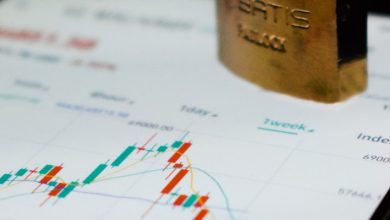Uniswap (UNI): How Decentralized Exchanges Are Changing Crypto

- Understanding the Rise of Uniswap in the Crypto World
- The Evolution of Decentralized Exchanges and Uniswap’s Role
- Exploring the Benefits of Using Uniswap for Crypto Trading
- Uniswap vs. Traditional Exchanges: A Comparison of Features
- The Impact of Uniswap on Liquidity and Market Dynamics
- Challenges and Opportunities in the Future of Decentralized Exchanges
Understanding the Rise of Uniswap in the Crypto World
Uniswap has emerged as a prominent player in the decentralized exchange (DEX) space within the crypto world. Its rise can be attributed to several key factors that set it apart from traditional centralized exchanges. One of the main advantages of Uniswap is its decentralized nature, which means that users have full control over their funds without the need for a middleman. This level of autonomy and security has attracted a growing number of traders and investors looking to participate in the crypto market.
Moreover, Uniswap operates on an automated market maker (AMM) model, which allows for seamless token swaps without the need for order books or liquidity providers. This innovative approach has made trading more efficient and cost-effective, as users can easily exchange tokens directly from their wallets. The simplicity and accessibility of Uniswap have contributed to its popularity among both experienced traders and newcomers to the crypto space.
Additionally, Uniswap has gained traction due to its support for a wide range of tokens, including many that are not listed on traditional exchanges. This has opened up new opportunities for users to access and trade a diverse selection of assets, further fueling the platform’s growth and adoption. As more projects integrate with Uniswap and leverage its decentralized infrastructure, the platform is likely to continue expanding its user base and influence in the crypto community.
Overall, the rise of Uniswap in the crypto world reflects a broader trend towards decentralization and innovation in the digital asset space. By offering a secure, efficient, and diverse trading experience, Uniswap has established itself as a leading DEX that is reshaping the way users interact with cryptocurrencies. As the crypto landscape continues to evolve, Uniswap is well-positioned to play a central role in driving this transformation and shaping the future of decentralized finance (DeFi).
The Evolution of Decentralized Exchanges and Uniswap’s Role
The evolution of decentralized exchanges has been a significant development in the cryptocurrency space. These platforms offer users the ability to trade digital assets without the need for a central authority. Instead, trades are executed through smart contracts on the blockchain, providing greater security and transparency.
One of the most prominent decentralized exchanges is Uniswap, which has played a crucial role in shaping the DeFi landscape. Uniswap operates on the Ethereum blockchain and utilizes an automated market maker system to facilitate trades. This innovation has made trading more efficient and accessible to a wider range of users.
Uniswap’s unique approach to liquidity provision has led to its widespread adoption within the crypto community. By allowing users to earn fees by providing liquidity to the platform, Uniswap has created a vibrant ecosystem of traders and liquidity providers. This has helped to increase the liquidity of the platform, making it more attractive to users.
As decentralized exchanges like Uniswap continue to grow in popularity, they are challenging the dominance of traditional centralized exchanges. With their focus on security, transparency, and accessibility, decentralized exchanges are providing a viable alternative for users looking to trade digital assets. Uniswap’s role in this evolution cannot be understated, as it has been at the forefront of innovation in the DeFi space.
Exploring the Benefits of Using Uniswap for Crypto Trading
One of the key benefits of using Uniswap for crypto trading is its decentralized nature. Unlike traditional exchanges that rely on intermediaries to facilitate transactions, Uniswap operates on a peer-to-peer basis, allowing users to trade directly with one another. This not only eliminates the need for a central authority to oversee trades but also reduces the risk of fraud or manipulation.
Another advantage of Uniswap is its high level of security. By leveraging smart contracts on the Ethereum blockchain, Uniswap ensures that trades are executed automatically and without the need for third-party intervention. This not only streamlines the trading process but also minimizes the risk of human error or hacking.
Furthermore, Uniswap offers a wide range of tokens for trading, providing users with access to a diverse array of investment opportunities. This allows traders to diversify their portfolios and potentially increase their returns. Additionally, Uniswap’s user-friendly interface makes it easy for even novice traders to participate in the crypto market.
Uniswap vs. Traditional Exchanges: A Comparison of Features
When comparing Uniswap to traditional exchanges, several key features set them apart. Uniswap is a decentralized exchange, whereas traditional exchanges are centralized. This means that Uniswap operates through smart contracts on the Ethereum blockchain, allowing users to trade directly from their wallets without the need for a central authority.
On the other hand, traditional exchanges require users to deposit their funds with the exchange, which can be susceptible to hacking or fraud. Uniswap also offers users the ability to trade any ERC-20 token without the need for a listing process, providing more flexibility and accessibility in the trading of cryptocurrencies.
Additionally, Uniswap uses an automated market maker (AMM) system, where trades are executed based on a mathematical formula rather than matching buyers and sellers directly. This can result in lower liquidity and slippage, but it also eliminates the need for order books and allows for continuous trading.
Overall, Uniswap provides a more secure, decentralized, and accessible trading experience compared to traditional exchanges. However, it is essential for users to understand the differences in features and functionality before deciding which platform to use for their cryptocurrency trading needs.
The Impact of Uniswap on Liquidity and Market Dynamics
Uniswap has had a significant impact on liquidity and market dynamics within the cryptocurrency space. By providing a decentralized exchange platform, Uniswap has allowed users to trade a wide range of tokens without the need for a central authority. This has resulted in increased liquidity for many tokens that may not have been easily tradable on traditional exchanges.
One of the key features of Uniswap is its use of automated market makers (AMMs), which help facilitate trades by providing liquidity through smart contracts. This has led to a more efficient market where users can easily swap between different tokens without relying on traditional order books. As a result, Uniswap has become a popular choice for traders looking to quickly and easily exchange tokens.
Furthermore, Uniswap’s decentralized nature has also had an impact on market dynamics. By removing the need for a central authority to oversee trades, Uniswap has created a more democratized trading environment where users have more control over their assets. This has helped increase transparency and reduce the risk of manipulation within the market.
Challenges and Opportunities in the Future of Decentralized Exchanges
One of the main challenges facing decentralized exchanges like Uniswap is the issue of liquidity. Without a central authority to facilitate trades, liquidity providers play a crucial role in ensuring that there are enough assets available for users to trade. This can sometimes lead to issues with slippage, where the price of an asset can change significantly between the time a trade is initiated and when it is executed.
Another challenge is the lack of regulatory clarity surrounding decentralized exchanges. As these platforms operate without a central authority, it can be difficult for regulators to enforce rules and regulations. This uncertainty can deter some users and investors from using decentralized exchanges, limiting their potential for growth.
However, despite these challenges, there are also numerous opportunities for decentralized exchanges in the future. One of the main advantages of decentralized exchanges is the ability to trade assets without needing to trust a central authority. This can help to reduce the risk of hacks and other security breaches, which have plagued centralized exchanges in the past.
Decentralized exchanges also have the potential to increase financial inclusion by providing access to financial services for people who are underserved or unbanked. This can help to promote economic growth and development in regions where traditional financial services may be limited.
Overall, while there are certainly challenges facing decentralized exchanges like Uniswap, there are also many opportunities for growth and innovation in the future. By addressing issues such as liquidity and regulatory clarity, decentralized exchanges have the potential to revolutionize the way that people trade and interact with financial markets.



